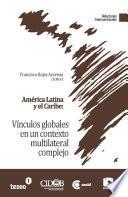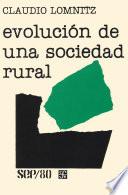América Latina y el Caribe: Vínculos globales en un contexto multilateral complejo
Ficha del Libro

America Latina y el Caribe es una region diversa y heterogenea en un mundo en mutacion. Las formas y tipos de insercion internacional de sus paises responden a miradas politico estrategicas distintas y eso se refleja en sus relaciones con otras regiones del mundo. La asociacion para la cooperacion aparece como una demanda efectiva para satisfacer los intereses nacionales y regionales tanto en la Union Europea como en America Latina y el Caribe. Esa cooperacion requiere establecer vinculos entre los diversos foros y procesos de coordinacion, cooperacion e integracion multilateral, regional y birregional dentro de una logica de gobernanza multinivel acorde con los cambios que conlleva la creciente multipolaridad. Para que la region latinoamericana y caribena aumente su influencia en el nuevo multilateralismo en construccion debera enfrentar un gran reto: construir una posicion comun en areas prioritarias, disenando, ademas, un proyecto politico estrategico que guie su insercion en el sistema internacional. En este sentido se observa en America Latina la emergencia de nuevas formas de asociacion a nivel intrarregional que se distinguen de los antiguos mecanismos de integracion. Asimismo se desarrollan entre las naciones de la region y los paises y grupos de paises fuera del continente nuevas relaciones que muestran la forma en que America Latina se esta insertando en un sistema con multiples actores. Ejemplo de ello son los BRICS y el G-20. [Description in English] Latin America and the Caribbean: Global Links in a Complex Multilateral Context Latin America and the Caribbean is a diverse and heterogeneous region in a transforming world. The forms and types of international insertion implemented by the region's countries correspond to different politico-strategic visions, and this is reflected in their relations with other regions of the world. Association for the sake of cooperation appears to be an effective demand for satisfying national and regional interests both in the European Union and in Latin America and the Caribbean. That cooperation requires the establishment of links between the different forums and processes of multilateral, regional and bi-regional coordination, cooperation and integration within a logic of multilevel governance that is in keeping with the changes brought about by increasing multi-polarity. In order for the Latin American and Caribbean region to increase its influence in the new multilateralism now being constructed, it must face an enormous challenge, which involves building a common position on priority areas, as well as putting together a politico-strategic project that can orient its insertion into the international system. Along these lines, Latin America is witnessing the emergence of new forms of association at the intra-regional level that differ from former integration mechanisms. Similarly, the new relationships being formed between the nations of the region and countries and groups of countries outside of the continent show how Latin America is becoming inserted into a system with multiple actors. Cases in point are the BRIC countries and the G-20."
Ficha Técnica del Libro
Número de páginas 510
Autor:
- Flacso (organization). Secretaría General
- Cidob (center)
- Fundación Carolina
Categoría:
Formatos Disponibles:
PDF, EPUB, MOBI
¿Cómo obtener el libro?
A continuación, te ofrecemos varias opciones para adquirir el libro.
Valoración
3.6
36 Valoraciones Totales







